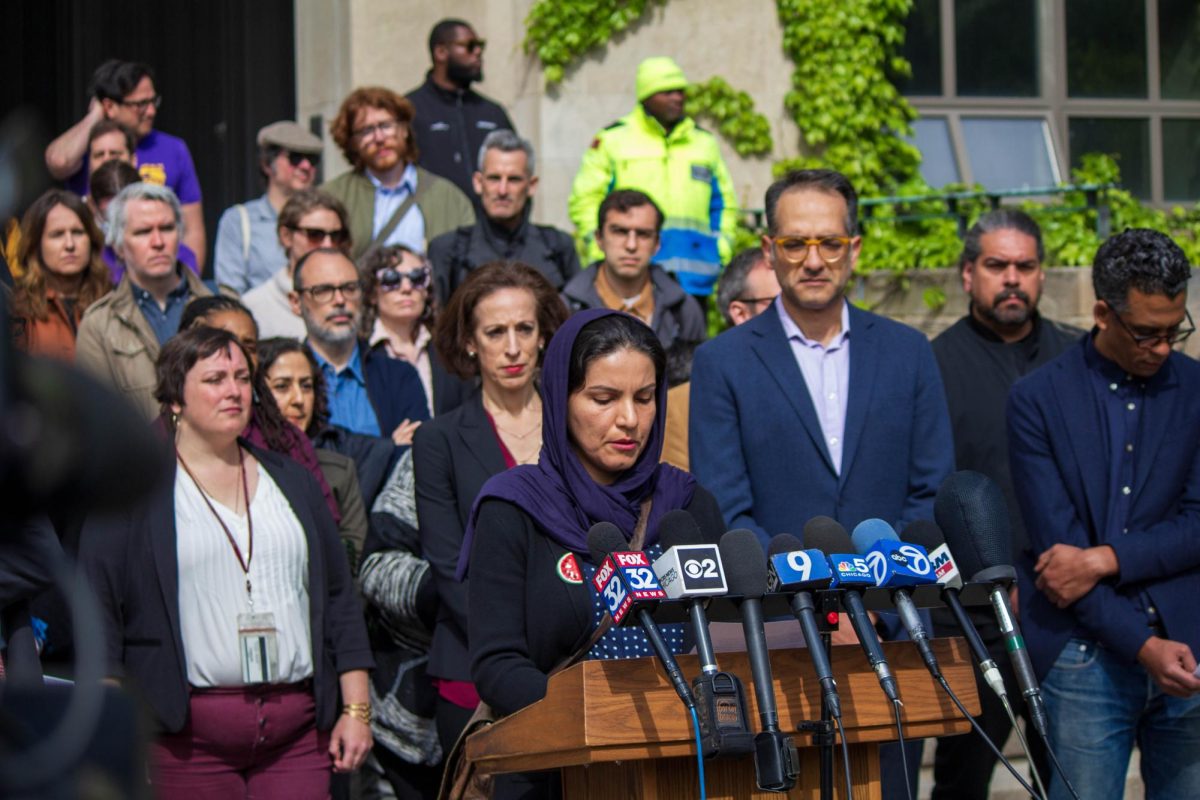
Nathaniel Rodwell-Simon
Faculty members of Faculty for Justice in Palestine speak at a press conference in front of Levi Hall.
Around 30 members of UChicago Faculty for Justice in Palestine (FJP) gathered on the steps of Levi Hall for a press conference at 9:30 a.m. Throughout the press conference, faculty members called for the University administration to allow the encampment to continue, acknowledge the destruction of universities in Gaza, and resume negotiating with encampment organizers.
“We’re holding this press conference to express solidarity with our students, who have spent the last week peacefully demonstrating in opposition to Israel’s genocide of over 34,000 Palestinians in Gaza and the systematic campaign of scholasticide being waged against Palestinian intellectuals and institutions,” FJP member Callie Maidhof, associate director of the Global Studies program, said as the press conference began.
According to Eman Abdelhadi, a Palestinian assistant professor in the Department of Comparative Human Development, the University abruptly ended negotiations at around noon on Sunday despite students feeling that the parties were close to reaching an agreement.
In a statement yesterday, FJP said the University agreed to a 12-hour buffer between the end of negotiations and any University-sanctioned police actions to remove the encampment as a condition for UChicago United for Palestine (UCUP) to enter talks with administrators. According to the statement, the buffer period ended at midnight on Monday morning. In a statement to the Maroon, the University said it had “sent no such communication.”
“Students have been productively engaging in negotiations with the University over the last week, while the University has continued in bad faith to escalate by repeatedly threatening police action,” Elham Mireshghi, an assistant instructional professor in the Divinity School, said. “As faculty members, we will protect the safety of our students if the administration attempts to violently remove them, even if that means arrest and detention.”
Multiple faculty members emphasized that they would disapprove of the University using police force to end the encampment and that they would be willing to be arrested alongside students if necessary.
“The University must not employ police force to put an end to student protests. To do so would violate the University’s duty to protect its students, as well as [students’] right to free expression,” Allyson Field, an associate professor in the Department of Cinema and Media Studies, said.
During the press conference, one onlooker repeatedly interrupted faculty members as they spoke. When faculty members spoke about universities in Gaza being destroyed, the onlooker yelled that the universities had “tunnels under them,” referring to accusations that Hamas uses civilian buildings as cover for military operations. During the Q&A section of the press conference, the onlooker attempted to ask whether faculty thought some students’ support for Hamas undermined the encampment’s legitimacy. Faculty ignored the question.
At the end of the conference, faculty members reiterated their support for student protesters and their demands.
“Our complicity as a university needs to end, and we will do everything in our power to end it,” Alireza Doostdar, an associate professor in the Divinity School, said.
After the press conference, Maidhof told the Maroon, “Today, on Yom HaShoah, we should be fighting against genocide,” referencing Holocaust Remembrance Day. “We should be remembering the people who were murdered… and doing everything we can to genuinely say ‘never again.’”
Maidhof also emphasized faculty’s support for students. “We try as much as possible to do a supporting role,” Maidhof said. “We are distinct from the students but at the same time we are very, very clear in our message that we as Faculty for Justice in Palestine are here 100 percent for the students, for this encampment, for their demands—and we will do everything we can to support that.”
In an interview the Maroon conducted after the press conference, Abdelhadi addressed criticisms that the encampment was disruptive.
“There’s a genocide happening, and we’re funding it. Our lives should be disrupted,” she said. “Disruption is important for any meaningful protest to happen. That being said, I think the students are doing a great job of trying to minimize the amount of disruption and being a really respectful part of campus.”
She criticized the University’s application of the principle of institutional neutrality, expressed in the Kalven Report, as well as its application of free speech and protest policies which are laid out in the Chicago principles of free expression. She raised the University’s support for Ukraine and its cutting ties with the Confucius Institute in China as examples to argue that the University is not truly neutral. The University’s split with the Confucius Institute in 2014 came amidst concerns that UChicago had allowed the Chinese government to supervise the program’s staff and curriculum.
“The University uses institutional neutrality selectively in order to avoid any kind of social responsibility. And it’s used free speech primarily to ensure that powerful people with racist views are not protested [against] or not shut down,” Abdelhadi said.
Abdelhadi said she did not want to see force used by police but would stand beside students if it was.
“We don’t want to be arrested. We don’t want our students to be arrested, but if that’s what has to happen, then so be it. And that’s really the administration’s choice to make, not ours,” Abdelhadi said.
Anushree Vashist contributed reporting.